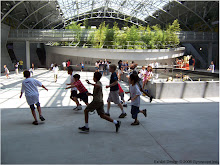
By Maria Mortati
This weekend, I attended a "Soldering: the Musical" class held at Critter Salon run by the smart & super nice Mark Allen of Machine Project:
"Learn to solder in this three hour long workshop presented by the amazing Mark Allen of Machine Project fame. Participants will learn to solder by building a primitive synthesizer. During the workshop the band ing will play music to solder by. As people get their synths working, they will join ing in playing some simple repeating musical patterns. At the end of the workshop everyone will play a simple and inevitably out of tune musical piece together."As a result:
- I can solder.
- My little machine works.
- We took all our instruments & "jammed" as a group with a real-live musician.
 All done in a simple, constrained but fun steps. It was geared towards a positive outcome in an informal vibe. It was so much fun, and I couldn't stop laughing.
All done in a simple, constrained but fun steps. It was geared towards a positive outcome in an informal vibe. It was so much fun, and I couldn't stop laughing.Here's the video of our "performance":
Then I brought my "instrument" home, and my 17 year old stepson couldn't get enough of playing with it. So I ordered a couple of kits online for him too.
The above sounds simple, but I've taken a number of these types of classes over the years. This was the first time it really... worked.
Mark has given this particular one over a dozen times to iterate & refine. If you'd like to learn how to be a master at a maker class, take one of his.









